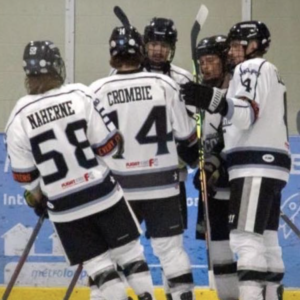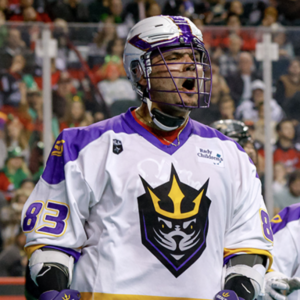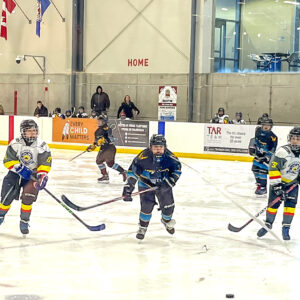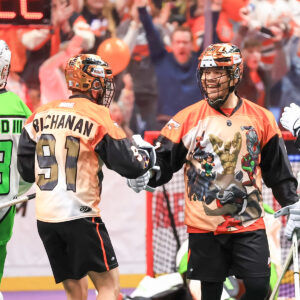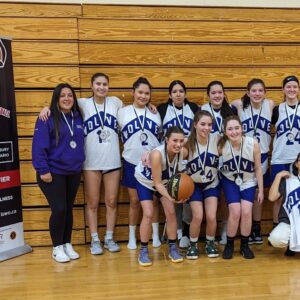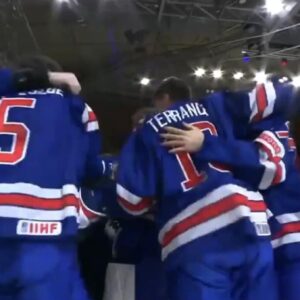
Chances are most hockey fans might be stumped if asked who the only Indigenous father and son are to win a Stanley Cup.
Hockey Hall of Famer and Ojibwe winger Reggie Leach is synonymous with hockey fans.
Reggie Leach, who was affectionately known as the ‘Riverton Rifle,’ was born in Riverton Manitoba, and during a Hall of Fame 13- year NHL career, won the Stanley Cup in 1975 with the Philadelphia Flyers.
Meanwhile his son Jamie who was born in Winnipeg Manitoba, and was drafted third round, 47th overall in the 1987 draft by the Pittsburgh Penguins went on to play 81 total NHL games with the Penguins, Hartford Whalers and Florida Panthers where he totaled 11 goals and 20 points. Leach, who in total played in the NHL for parts of five years, won two Stanley Cups with his first coming in 1991 with the Penguins and his second coming a year later when with the Penguins he once against lifted Lord Stanley on June 1, 1992 after the Penguins swept the Chicago Blackhawks.
Prior to his NHL career, Jamie Leach, who like his dad is a Band member of Berens River First Nation, competed in both the Western Hockey League with the New Westminster Bruins and Ontario Hockey League. In the OHL, Leach played with the Hamilton Steelhawks and in 1988/89 with the Niagara Falls Thunder where he exploded offensively with highs of 45 goals and 107 points. In 1989, Leach proudly represented Canada at the World Junior Championships which were held in Anchorage Alaska. In that tournament, which the Soviet Union won, Leach played against some big hockey names such as Pavel Bure, Sergei Fedorov, Alex Mogilny, Teemu Selanne, Jeremy Roenick and Mike Modano to name a few.
Following his playing career, Jamie Leach made a name for himself in coaching. Starting in 2001-2002, his presence behind the bench was immediately felt as he led the MJHL’s Southeast Blades to a 35-point improvement and as a rookie bench boss, won MJHL Coach of the Year award.
In his second year, Leach continued to make all the right decisions as he led the Blades to a 41- win campaign and fourth in the overall standings. During a deep playoff run, Leach led his team to the MJHL finals where they fell short in losing to the defending champs, OCN Blizzard.
“The 2003 final was one of my proudest hockey moments,” Coach Leach said. “Being a part of the only league final with two First Nation based teams. We had a team of about 40 % indigenous players, not that we had quotas and that it mattered. All of our players formed a very tight knit group which was a special part of that experience.”
While Reggie Leach had an incredible career, which saw him score 381 goals and 666 points in 934 NHL games, he along with son Jamie take just as much pride in working with the youth, in Shoot to Score Hockey which the father and son duo organized back in 2006.
“Our hockey schools aren’t just for hockey,” Reggie Leach said. “We’re there to teach them as much as possible from being on time, being respectful, doing the best they can at all times and treating everyone the same.”
Since they originated Shoot to Score, both Reggie and Jamie Leach have visited over 90 locations across North America, with about 75% of those camps being Indigenous or First Nation communities. Something Reggie and Jamie Leach take tremendous pride in.
“We’re proud of the exposure we can offer kids in their own communities who can’t always get to major centers easily,” Jamie Leach said. “Each year, we are able to reach anywhere from 1,500 to 2,000 athletes with our program.”
In terms of frequently visiting remote locations and learning what life is like for these kids, Reggie Leach stated,
“You see these kids out there having a good time. Meanwhile you’re thinking about what they might be going through with tough times at home or they don’t have enough food at home but they’re out there playing hockey and enjoying the wonderful game that we love with beautiful smiles.”
This father and son duo have had a tremendous impact as a role model, not only with their NHL careers, also making that strong commitment towards serving as role models and helping the youth to gain positive experiences from playing hockey, while learning how to go after their goals and be the best they can be.



